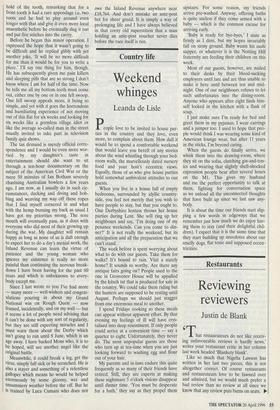Restaurants
Reviewing reviewers
Justin de Blank
That restaurateurs do not like receiv- ing unfavourable reviews is hardly news,' writes your restaurant critic in her column last week headed `Blankety blank'. Like so much that Nigella Lawson has written in her last two pieces, this is not altogether correct. Of course restaurants and restaurateurs love to be fawned over and admired, but we would much prefer a bad review than no review at all since we know that any review puts bums on seats. ► To quote but two examples: Fay Maschler has told me that she used to be puzzled but is now amused when, after some damning review, friends tell her how grateful they are to her for a great new eat- ing experience. The second concerns the most cruel and unfair criticism I can recall by Jonathan Meades about Buchan's Wine Bar in Battersea shortly after it was opened by Jeremy Bolam, the former Ebury Wine Bar manager. 'It really put us on the map,' Jeremy told me. 'People came to see for themselves if it was as awful as he said, and we haven't looked back'.
So, thank you, Nigella, for your piece. Sadly, I can't accurately report how many extra covers it sent us because we have since had a fair review in a paper which with your help has filled us up. As I write this piece at the kitchen table on Sunday afternoon I send up a silent prayer, `Restaurant reviewers, God bless them. May they multiple and flourish and write well enough to be read.'
But here is a simple comparison: Opening a restaurant involves locating a site, obtaining planning and other consents, negotiating the lease or purchase, selecting a building contractor, agreeing estimates and time-scale, overseeing building and decorating work, installing the kitchen and hoists, meeting the EHO and fire officers' demands, buying tables and chairs, plate, glass and cutlery, choosing the till and com- puter systems and getting them to work, selecting suppliers and agreeing terms, engaging and training management, kitchen and front-of-house staff, preparing and operating the marketing plan. All this having first raised the money.
To write a restaurant review involves travelling to and from the restaurant, eat- ing a meal while entertaining a sympathetic companion and then the necessary compo- sition time at the word processor before fil- ing copy.
For one the costs are high and the rewards uncertain. For the other, the costs are minimal and the rewards (though mod- est, I am told) assured. Restaurateurs sometimes wonder if the discrepancy ever occurs to the reviewer.
Some other points for consideration: with the exception of very grand and corre- spondingly expensive restaurants (why them, one wonders?) it is rare for a restau- rant to be reviewed more than once by each critic, so what you write stays in your reader's mind uncorrected. For instance, in the case of Miss Lawson's review of three weeks ago, not one dish that she (rightly in my opinion) criticised was still on the menu when her piece appeared, effectively ren- dering it worthless to readers of The Spec- tator. But my suggestion that a telephone call would avoid such errors was scorned. I would like reviewers to remember that they write their pieces on slim evidence — gen- erally a meal for two. Contrast this with David Brown's Michelin guide where up to a dozen visits by trained inspectors is often called for before stars and symbols are allo- cated.
There is a vogue to restrict restaurant columns to reviewing just one establish- ment at a time. I believe this to be a mis- take. There are far more restaurants opening than columns to review them so readers effectively are deprived of informa- tion and restaurants of press comment; also can I be the only one to deplore 'fill-in' writing generally used more to demonstrate the writer's erudition than to convey infor- mation of value to the reader, largely one suspects because the writer has run out of interesting things to say about the single restaurant under review?
I find reviews often short of the informa- tion I seek. Is it a destination or a locality restaurant? Let's have more precision on prices, i.e. how much for individual dishes and wines instead of the casual 'around £70 for two'. As a general comment, since after all their employers are paying, reviewers do not give sufficient consideration to what to expect at different levels of price.
Miss Lawson clearly neither likes nor reads press releases. Of course there are those that are just silly puffs, but others give valuable factual information that reviewers should know when they compose their pieces.
A word on starting up restaurants referred to in Miss Lawson's latest piece and in your Dublin correspondent's letter. The restaurant about which her original piece was written is, I think, the 12th in whose launch I have participated, and I freely admit that I still do not know how best to handle launches. In this instance, we carefully avoided all advance publicity; we opened with nearly double staffing since one knows that unfamiliarity reduces effi- ciency; also it means that, once the restau- rant settles down the permanent team is picked from those who perform best. On checking, I find that we did not charge for over 120 meals where either the food or service, or both, were not up to an accept- able standard in the start-up period. Larger operations charge half price for the first week or so which has the disadvantage that bargain hunters fill the place up right from the start, overstretching skills and resources.
And a final word on food. I had the huge advantage, because my parents lived in Paris, that from an early age I ate the sort of food that the reasonably prosperous French middle class used to eat at home and in restaurants. Subsequently, I ran businesses in Belgium and in Paris in the Fifties and Sixties, when, in my no doubt rosy recollection, the overriding character- istic of all meals was immensely good raw materials and extreme simplicity of cooking so that the inherent flavours predominated.
How does one explain to a young English brigade, caught between the muddle of the average catering college and the horrors of the latest chic food fad, that this is what they must now learn to do again?



































































 Previous page
Previous page